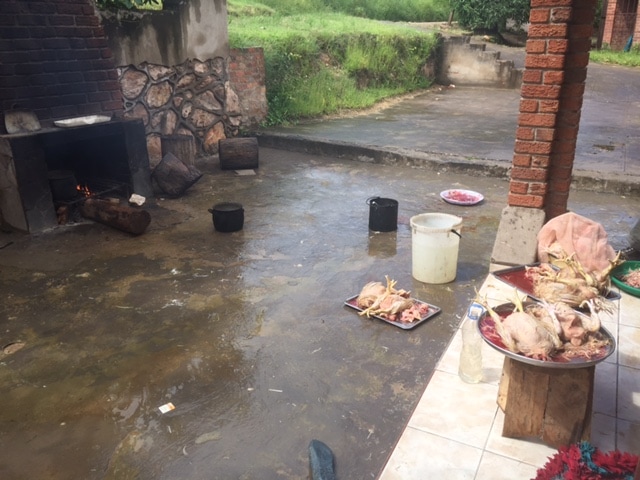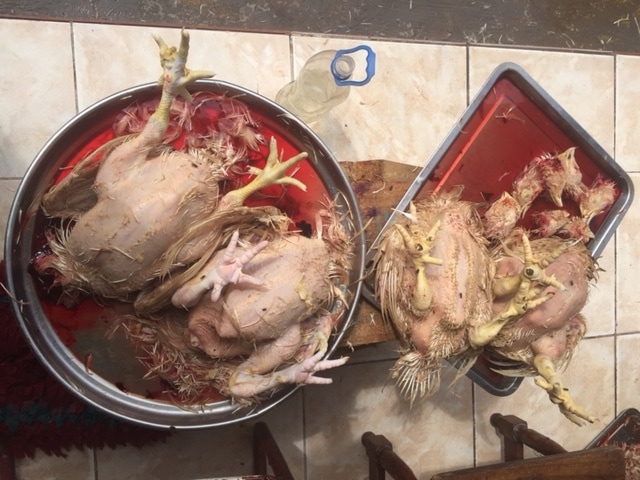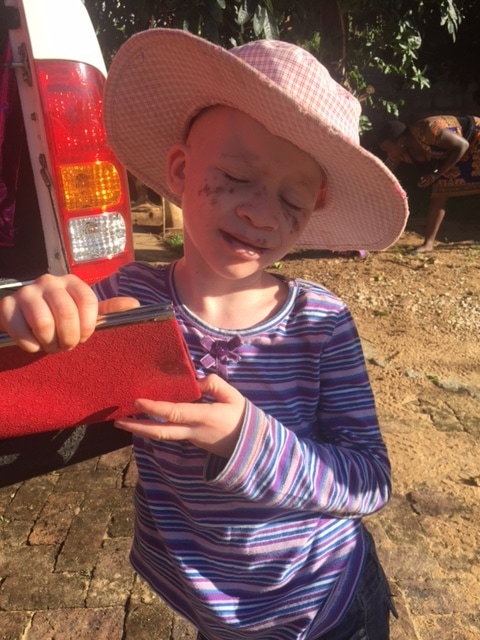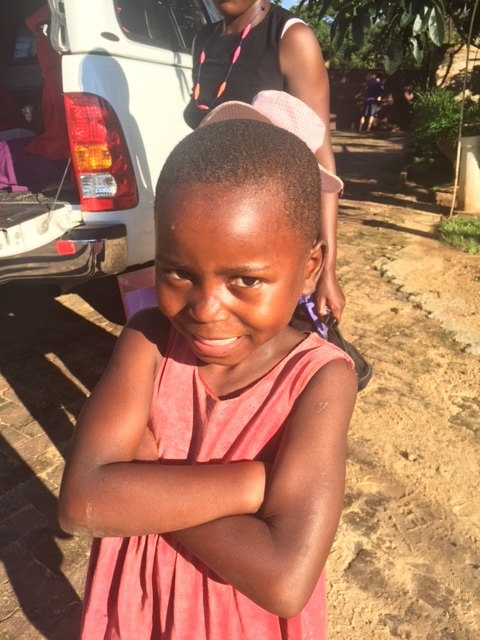Chicken and Guts
But first, about Tuesday. When I went to our Tuesday group, where we meet in someone's home in the high density area, I was welcomed by some interesting sights and smells. I smelt blood and scorched, wet feathers before I ever saw anything. I hobbled down the very steep driveway, holding on to one of the ladies' arms and treading carefully over sharp rocks, placing my cane in strategic locations before each step. The stench hit me in the face and the humidity didn't help. I came across Gogo (a term of endearment, which means grandmother, for the owner of the home in which we meet) and, one of the other ladies and a gentleman sitting right outside the front door with trays of dead chickens in front of them. There was a bucket of boiling water with floating feathers and a basin filled with blood and chicken heads, a trail of feathers and blood drippings everywhere on the floor. Today was slaughtering day for the chickens. The chicken would lose it's head, then it would hang briefly to drain some blood, then while holding the neck, they would dip the chicken into the very hot water to help with removing the feathers. Then finally, they would place the wet decapitated chicken on a tray in front of them and start plucking feathers profusely. The ladies immediately stood up from their chairs, making a bee-line in my direction. I was quick to point back to their work and insist they continue with what they were doing. I immediately greeted them verbally, in hopes that they would not shake my hand and embrace me covered in chicken blood, guts and feathers. They returned the greeting verbally and returned to their seats to my great delight. I stood on the porch where they were all seated and visited with them. I surveyed the carnage that looked more like a homicide location, rather than a well oiled machine. Although this was no doubt a system that has been followed countless times before, it was not the most inviting scene.
I praised Gogo for how beautiful her chickens looked, how big and healthy they were and insisted how good they would be to eat and what a good price she would get for them when she sells. She grinned from ear to ear upon hearing my praise, so proud to show off her hard work and labor. She explained where they would go for sale, how old they were, how much she thought they weighed and how many they had already slaughtered. What I described above was through my "western eyes," and yet to each lady who attended the group today, who was met by the same stench and stepped over the same carnage, what they saw was food, wealth, and needs met. To them, the aroma was sweet and inviting and the strewn feathers and blood drippings were a sign of blessings and ones they wish they were reaping themselves.
On this day, I brought along socks in an attempt to not feel flies crunching underneath the soles of my feet, old pieces of food covered in ants and spills of liquid that forced dust to cling to my skin. However, the heat quickly made me remove my socks and welcome the debris that would cover my soles as they always do. As I taught the ladies their 6th sewing stitch, a breeze came flowing through the door, but along with it came a stench and reminder of what was taking place at the front door. I involuntarily crinkled my nose and yet all at the same time welcomed the fresh air.
Often times, ministry is messy and on the mission field, it's almost always messy in a very physical way. Unfortunately, it's the emotional messiness that is often harder to bare.
In Zim, there are some similar struggles that are found in the US and then there are those that are not even remotely similar. Just like in the US, we have teen pregnancies - two teenagers with hormones taking part in something that only mature, married adults should be doing - the consequences are huge. In Zimbabwe, the possibility of contracting HIV/AIDS is higher and a pregnancy is just as likely as anywhere else. One of the new ladies in our group is a young teen. She joined a few weeks ago and her due date was right around the corner. Some of the older ladies made a few comments of disapproval and I was quick to run to her aide, to love on her and encourage her, reminding the whole group of the blessing that a child is. However, a baby also means a new mouth to feed, no option of returning to school and an even smaller chance to be employed. The group warmed up to her pretty quickly and an older lady took her under her wing. Yesterday, she gave birth to a beautiful baby boy. He is healthy and mom is doing well. I left group yesterday afternoon in haste, hoping to see the new mom and precious bundle of joy during the allotted 1 hour visiting time at the hospital.
I only knew her first name, so it took a few minutes to actually find her in the maternity ward. Most everyone stared as this murungu (white person) walked through the halls, looking for the room. I called out her name and finally found her in a big dorm-like style room, that had about 20 single beds in it. About 10-12 of the beds had new moms in them and everyone except Michelle had a visitor. She was in the far, back corner of the room, alone with her little newborn. As I walked in, she immediately beamed with surprise and excitement that someone was there to see her. Again everyone stared and the whispers began, but I looked directly at her, ignoring all the people around me. I brought a few donated items to give to her - a baby blanket, 2 little blue outfits, 5 cloth diapers and some socks. I set the plastic bag of items down next to the bed and congratulated her, Makorokoto! I hugged her and she kept thanking me for coming to visit. Immediately, she pushed this small little bundle, wrapped in several blankets, into my arms. He had just been born a mere 14 hours prior and was peacefully asleep.
Her little one still didn't have a name, which is not uncommon. I quickly prayed that he would receive a positive name, a strong name and a name that he would be proud of. Most children receive their name based on the emotion their mother was feeling, or the circumstances of life at the time during the pregnancy. It's not uncommon to hear names like, Loveless, Pain, Not Again, No More, Enough, Lonely - some names are in English and other are the Shona equivalent.
Before I left, I asked if I could pray for her and her baby, to which she agreed. Everyone in the room was talking and visiting and yet as soon as I bowed my head and started to pray, the whole room silenced, as if in respect while I talked with the Almighty - or purely out of curiosity for what I was about to say. The moment I uttered Amen, the chatter picked up again. Then I wished her well and was on my way.
Back to the reason for my tears...
Today during the devotional time, I shared about "how to pray." So I obviously used Jesus' example of "The Lord's Prayer" found in Matthew as our guideline. Like every week after the devotional, we talk for a little while. I find out what is happening in the ladies' lives and ask them how I can be praying for them and we share each other's struggles, hopes and even dreams... unfortunately, very rarely are there any dreams. The day-to-day struggles are too many and too great to even allow the possibility of dreams.
I usually probe the ladies with some specifics like family, health and this time of year, school fees. Everyone bowed their heads. First, there was silence then one-by-one the ladies shared how almost none had paid school fees yet. It's a mere $40 - $58 for the term (3 months), but that is just too much. Several of the ladies have kids who are just starting first grade or first year in high school, for them the fees are $200 due to a new school and entry fees. Some children have until tomorrow to pay, or else they will be sent home. Others have not even been allowed to attend, since their parents can't afford it. It breaks my heart. These women speak with so much pain, almost defeat, feeling ashamed that they cannot send their kids to school.
I remind them that soon the chicken program will be up and running, but of course it will be 4-6 months before they will receive an actual income... so what do they do until then? In the meantime, some ladies ground up peanuts for peanut butter. Others sell some fish they catch. Some, occasionally, do some cleaning. Some sell the fruit from their trees, but all of that money goes to pay for the little bit of food they and their families get to eat.
They all said that currently, they aren't able to sell the items they have, due to "nobody in their community having money to buy anything." I hesitated as I prepared to ask the next question, "So how do you eat?" Already, a lump had formed in my throat as I felt helpless, listening to the great need to cover the cost for education for their children. First, there was silence and then one by one, the ladies said how or what they ate. It was generally some greens and on occasion some watered down porridge, but most admitted that there are usually DAYS between meals... at least to ensure that their kids would have one small portion once a day.
I repeatedly said "sorry" (a common way to show empathy in Zim). I listened carefully, I made eye-contact, I nodded my head, I said my sorries and then without notice, the tears began to flow. I found myself getting angry, angry that my emotions were getting the best of me. How dare I cry... this was their story, their pain, their tears. When I composed myself, I asked them if we could pray once again, pray with anticipation, pray with fervor and pray knowing that God doesn't always answer our prayers the way we want or even expect. Immediately, every lady bowed her head and in unison we prayed, we cried out to God - first in praise and thanksgiving, but certainly in expectation and supplication. The ladies lifted to their knees. They raised their hands and they prayed with so much passion and so much faith that I was fearful my cheeks may not stay dry once again. As the group ended their prayers in whisper, the mood felt somber and yet, surprisingly hopeful.
As I encouraged them to pray and prayed alongside them, I wondered if it was enough. I wondered if God expected more of me, more of JM2Z. I wondered how we could meet basic needs NOW, while striving toward self-sustainability. Just last week, we looked over our personal finances. We looked over the JM2Z budget... there was no wiggle room. These ladies do not know our situation. They do not know that we live *paycheck to paycheck. They do not know that the big, fancy Toyota that picks them up each week was in fact purchased by generous donors and bought for a deal. They do not know that just this past Monday, I felt **guilty for buying a Snapple drink. We have a strict budget and yet I saw a Snapple, something I used to enjoy in the US, and I was thirsty so I bought it. However, as I drank it in the car on our way back to Chinhoyi from Harare, I expressed my guilt to Andrew. I told him how selfish I had been to purchase a drink for $3 when I could have gotten a soda for $2 less. He insisted it was a treat and that it was totally fine. I went on to explain that $2 was more than any of the ladies make in a day. I insisted that if we could carve out an extra $2 from our budget, we could send only one child to school... could we do it? Then he asked, "Which child would you pick?" The pit in my stomach seemed so deep... so helpless. Surely we could do more. Surely God answers His prayers through us or people like us.... or people like YOU!
I still don't have all the answers for all the questions that seem to arise anew each day, but I know this one thing... Ministry is Messy!
*Please know that our needs are met.
**We are not encouraging guilt by any means. Please know these are merely MY feelings, not an attempt to place any of these negative feelings upon you. Please hear our hearts as we share them.





 RSS Feed
RSS Feed